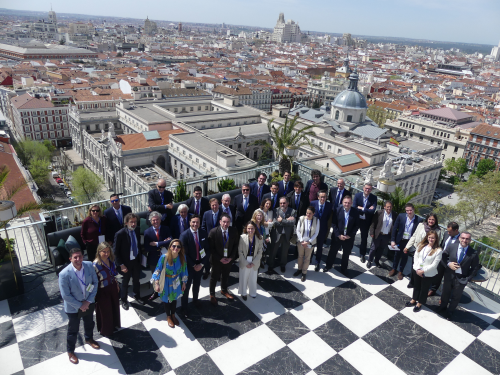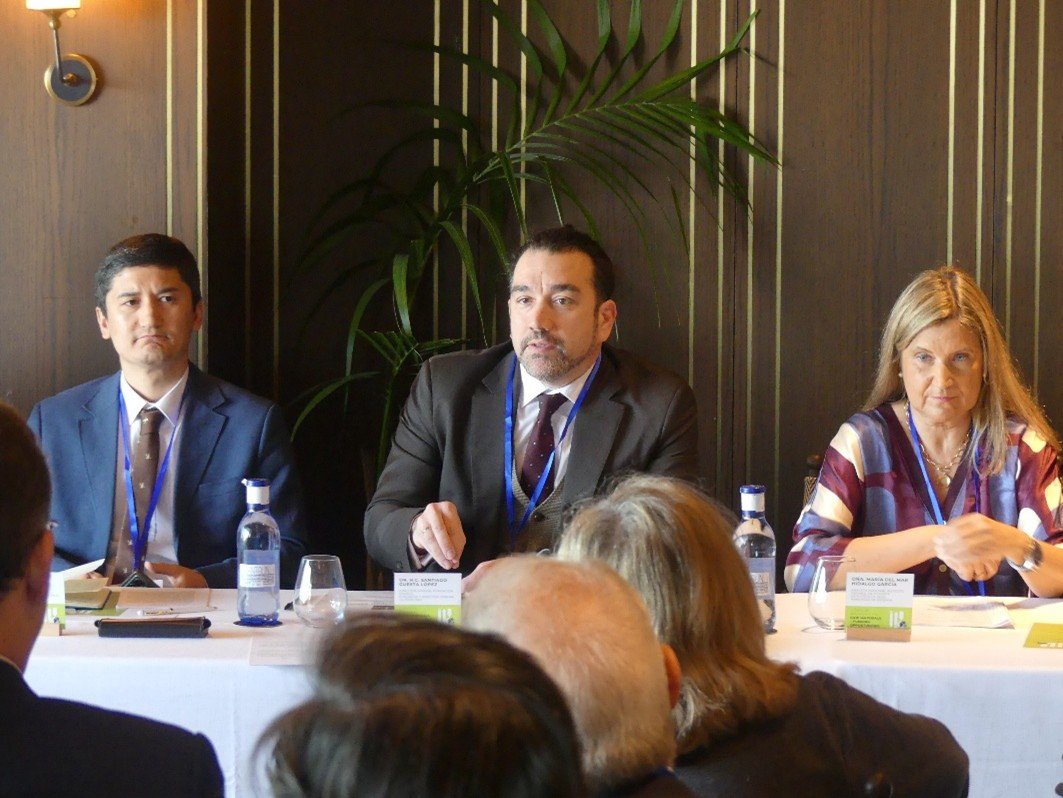Madrid hosted a key debate on investment in critical raw materials and the instruments to ensure their strategic financing.
Our day by day / 28-04-2025In an international context marked by growing geopolitical tensions, the Genoa Financial Club hosted a high-level strategic breakfast that brought together representatives of the mining ecosystem, diplomats, geostrategic analysts and business leaders.
The objective: to address current challenges in access to critical raw materials, increasingly conditioned by trade disputes, bloc rivalries and the urgency of reducing Europe's external dependencies. The participants agreed that guaranteeing a stable supply of these resources is not only essential for European industry, but also for preserving its technological, energy and defence autonomy.
The event, promoted by the Iberian Sustainable Mining Cluster and the ICAMCyL Foundation, organised in the framework of the European project I4-GREEN, was coordinated by Dr. Santiago Cuesta López, general director of the ICAMCyL Foundation and the Iberian Sustainable Mining Cluster (ISMC), underlined the imperative need to invest in the exploration, extraction, processing and recycling of critical raw materials within the European territory. In this sense, the importance of building resilient value chains and mobilising European funding instruments to accelerate strategic projects aligned with the objectives of the Green Pact and the EU's industrial autonomy was highlighted. The experts stressed that geopolitics is no longer an external factor, but a central element in shaping industrial and investment policies, placing raw materials at the heart of the debate on Europe's economic security.
Cuesta López, who moderated the first panel focused on the impact of raw materials in the new geopolitical context, opened the day with a speech that set the tone of the debate, stressing that, "raw materials are no longer just an economic or industrial issue: they are a question of security, sovereignty and the future of Europe. If we want to remain competitive, we must strengthen our innovation and industrial cooperation ecosystems, avoiding new strategic dependencies.
This first panel, with the prominent participation of H.E. Mr. Nodir Ergashev, Consul of the Embassy of Uzbekistan in Spain, underlined the crucial role of his country as an emerging supplier of strategic raw materials for Europe. "Uzbekistan is committed to a strong and transparent partnership with Europe. Our geographical position and natural resources make us a key partner for the stability of supply on the continent," he proposed. Ms. Eugenia Pérez, Commercial Attaché of the Canadian Embassy in Spain, highlighted the Canadian model of responsible exploitation of natural resources, underlining the importance of fostering bilateral partnerships with a long-term vision. Cuesta-López closed the debate by highlighting "the importance of linking strategic and critical materials for the future of the planet's energy supply, which is linked to economic growth and defence". "Without tungsten and lithium among other resources, there can be no future nuclear fusion energy plan, and without beryllium, tactical nuclear warheads cannot be developed, which explains the US interest in this mineral," the expert stressed. The panel was also attended by the senior analyst of the Spanish Institute for Strategic Studies (IEEE), María del Mar Hidalgo García, the director of EsadeGeo, Dr. Ángel Saz-Carranza, and Dr. Arnoldus M. van den Hurk, founder of REMIO and R4Mining.
The second panel, moderated by Raúl Fernández Abad, president of the Madrid Mining Club and CEO of Leonore Development, addressed the impact of geopolitics on the financing and business of commodities. It was attended by the CEO of Visco Orinoco, David Niknejad, the CEO of SALORO and President of the ISMC, Álvaro Serrano, the director of international relations of the Nogar Group, Ignacio López-Bachiller, and the commercial director of the Port Authority of Huelva, Jaime Beltrán.
Fernández Abad, stressed that "Developing solid investment projects in critical raw materials is not only a question of economic opportunity, but a strategic priority to guarantee Europe's industrial sovereignty. Without a solid base of our own resources, we will not be able to lead the energy transition or compete in key technologies of the future". For his part, Álvaro Serrano stressed the strategic importance of tungsten, a key mineral for the EU, which is extracted from the Barruecopardo mine in Salamanca, one of the main sources of tungsten in Europe, "it is an essential mineral for various technological and defence industries, and its secure access is fundamental for Europe's autonomy in key high-tech sectors". Jaime Beltrán also highlighted the strategic role of maritime transport and port logistics in the competitiveness of the raw materials supply chain.
Milena Stoyanova, Project Officer at the Executive Agency for the European Innovation Council and SMEs (EISMEA), also participated in the conference, highlighting the opportunities that the European Union offers in the framework of the Interregional Innovation Investment Funds (I3). Finally, together with Cuesta-López, an expert in Brussels in this type of fund, they highlighted the suitability of using this financial instrument to promote industrial innovation ecosystems and business projects aligned with the European strategy of the green pact in tranches of up to 10 million euros, involving industrial actors and centres of innovation and competition.
The breakfast ended with business synergy sessions aimed at promoting new opportunities for collaboration between investors, companies and institutional representatives, fostering the exchange of ideas and the strengthening of strategic alliances in the commodities sector at European and international level.

